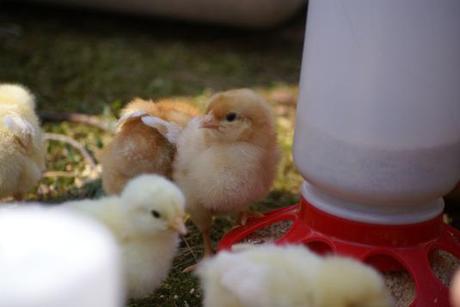This is going to be the first spring in 3 years that we aren’t going to have chicks in the house. No tiny peeping from the mudroom and none of that stinky organic odor as they grow, eat, and poop in their crates until they are old enough to go outside. I think we’re going to find that we will miss all that.
I realized this when I saw that Charlie’s baby waterer and feeder (plastic bottles attached to a red base) had been put in a box to be stored away with our other chick equipment kept in waiting until needed. Charlie is a big girl now, she eats from a converted casserole dish (deep sides so that she doesn’t splatter her food all over the place) and shares her water-drinking with the dog in the community bowl.
Yup, there will be no little peepers for us this year. As it is, we have a total of 35 chickens and although 7 of them are bantams of which some are the size of fat pigeons, and one lives in the house, it still makes for a full henhouse. As much as I would like to get more chickens, unless we enlarge the henhouse (and we’d rather send our kids to college, thank you very much) we are going to have to put new chicks on hold.
Of course we are still looking forward to a single new Black Copper Maran juvenile (already named Verruca) sometime this summer to be a playmate for Charlie but other than her, our flock is in lockdown.
We have had remarkably little turnover in our flock. None of our chickens have been taken out by predators and the very few (total of 4 over the years) that have died (not counting the roosters we coned) we think were the result of impacted eggs. None of them appeared sick, we would just go out and find them under the henhouse dead. I have yet to do an autopsy on any of our dead birds but a working hypothesis of impaction works for me.
You expect some of your flock to turnover. They are outside all winter long, they lay eggs almost every day, they eat things they find in the ground, there is a lot of opportunity for misfortune. It’s just natural that there are things out there that are going to get them.
But on the other hand, if they are protected, if they are given enough food and water with supplementation from your kitchen scraps, if the henhouse is well maintained, you aren’t going to lose that many. You’re going to find that your chickens will live on from one year to the next.
So it is both a blessing and a curse that this year there will be no tiny balls of fluffy mischief in our house. And although we aren’t going to have any chicks, Charlie still lives in the house so I think that technically, that still makes us covered.


